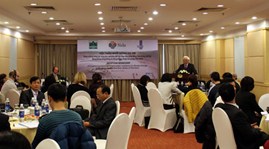
To help address this issue, a bilateral project was launched by the Vietnamese Association for the Conservation of Nature (VACNE) and the Stockholm International Water Institute (SIWI) to “strengthen farming’ resilience to climate change in the country’s Mekong and Red River deltas. A conference on the project was opened in Hanoi on January 22. Current trends shows that climate change will result in a significant temperature increase, leading to sea level rise, increased water and soil salinity, and dramatic changes in weather and flood patterns. Increased precipitation during rainy season and perceived drought during the rest of the year are among the current trends observed by national agro-meteorologists and the international research community. The potential impacts of climate change are likely to be serious for agricultural production and water resources availability. About 80-90% of the population depends on agriculture, which together with water resources has been pinpointed, as most vulnerable. Low land fish and rice farming are key sectors for millions of Vietnamese, and both sectors are key for the food security of the country, with Vietnamese rice exports putting the country as the second largest rice exporter in the world. The project is partially funded by the Swedish International Development Agency (Sida) and aims at helping the country increase the resilience of its farming communities by synthesising international and field research on this topic, and eventually raise awareness among farmers, and building capacities of water management practitioners at government agencies on what needs to be done to avoid a devastating socio-economic downturn due to climate change./.

 Previous page
Previous page Back to top
Back to top







